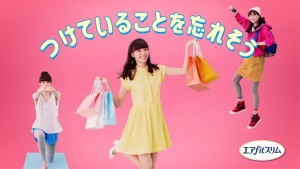Presented By: Center for Japanese Studies
CJS Thursday Noon Lecture Series | The Power of the Pad: Menstrual Products and Embodied Femininity in Japan
Maura Stephens-Chu, 2023–24 Postdoctoral Fellow, Center for Japanese Studies, University of Michigan

Attend in person or via Zoom. Zoom registration at http://myumi.ch/x7r8n
In Japan, menstrual product manufacturing and advertising rakes in millions of dollars each year, and most women have access to a plethora of menstrual products. Women strategically use disposable menstrual pads to maintain an idealized feminine aesthetic and affect. The pad also acts as a mediator—or barrier—between a woman and her body; this reduced sensory relationship produces markedly different menstrual experiences from those who use other products like tampons or reusable cloth pads.
Maura Stephens-Chu has served as a Visiting Assistant Professor of Anthropology at Miami University in Oxford, Ohio. She received her Ph.D. and MA in anthropology from the University of Hawai‘i at Mānoa. She specializes in medical and cultural anthropology, with an emphasis on embodied experiences of menstruation in contemporary Japan. Broadly, Maura’s multidisciplinary and intersectional research includes theoretical and methodological approaches from anthropology, Japanese studies, gender studies, history, and science and technology studies. She has conducted extensive ethnographic research in Tokyo, Japan, on young women’s perceptions, education, and personal experiences of menstruation and commercial menstrual products. Her historical analysis of Japanese menstrual taboos, “From Sacred to Secret: Tracing Changes in Views of Menstruation in Japan,” can be found in the open access journal, Silva Iaponicarum. Currently, Maura is researching the formation of both layperson and medical understandings of conditions that fall under the umbrella of menstrual “irregularity,” including endometriosis, amenorrhea, and severe dysmenorrhea.
This lecture is made possible with the generous support of the U.S. Department of Education Title VI grant.
If there is anything we can do to make this event accessible to you, please contact us at wugou@umich.edu. Please be aware that advance notice is necessary as some accommodations may require more time for the university to arrange.
In Japan, menstrual product manufacturing and advertising rakes in millions of dollars each year, and most women have access to a plethora of menstrual products. Women strategically use disposable menstrual pads to maintain an idealized feminine aesthetic and affect. The pad also acts as a mediator—or barrier—between a woman and her body; this reduced sensory relationship produces markedly different menstrual experiences from those who use other products like tampons or reusable cloth pads.
Maura Stephens-Chu has served as a Visiting Assistant Professor of Anthropology at Miami University in Oxford, Ohio. She received her Ph.D. and MA in anthropology from the University of Hawai‘i at Mānoa. She specializes in medical and cultural anthropology, with an emphasis on embodied experiences of menstruation in contemporary Japan. Broadly, Maura’s multidisciplinary and intersectional research includes theoretical and methodological approaches from anthropology, Japanese studies, gender studies, history, and science and technology studies. She has conducted extensive ethnographic research in Tokyo, Japan, on young women’s perceptions, education, and personal experiences of menstruation and commercial menstrual products. Her historical analysis of Japanese menstrual taboos, “From Sacred to Secret: Tracing Changes in Views of Menstruation in Japan,” can be found in the open access journal, Silva Iaponicarum. Currently, Maura is researching the formation of both layperson and medical understandings of conditions that fall under the umbrella of menstrual “irregularity,” including endometriosis, amenorrhea, and severe dysmenorrhea.
This lecture is made possible with the generous support of the U.S. Department of Education Title VI grant.
If there is anything we can do to make this event accessible to you, please contact us at wugou@umich.edu. Please be aware that advance notice is necessary as some accommodations may require more time for the university to arrange.